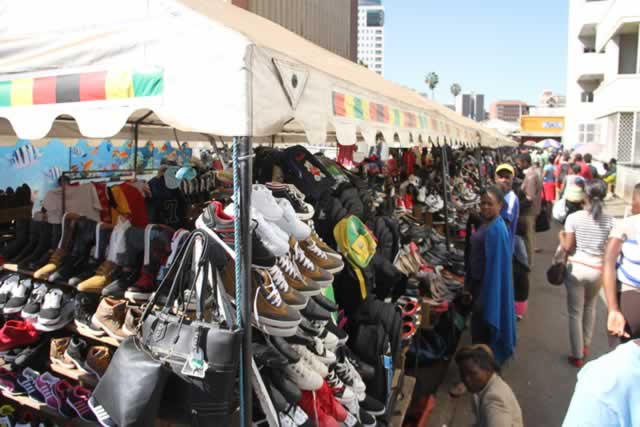It’s vendor VS vendor in Harare

Fortious Nhambura and Christopher Charamba
Bhero idzva, bhero richingovhurwa. Maskirts ana amai $3 chete (new clothing bale, a new bale just opened. Ladies skirts, only $3 each), Christina Bayera, a vendor, shouts.
She operates from a tent and is one of the traders offered legal vending space by the Harare City Council late last year but has to shout at the top of her voice to attract the next customer.
Competition is stiff and she tries to outdo an illegal vendor spreading her wares a few centimetres outside the tent.
This is a daily routine. It is survival of the fittest and cleverest. Business has been going down at her official stall.
Those who operate illegally charge less for their goods as they do not pay anything to council.
She is now contemplating joining the thousands that are spreading and selling their wares in the open.
Christina is feeling the heat and it is making her weak.
She pays $5 a day for use of the stall.
Vending has indeed become the lifeline for many people in the country but it is the manner in which it is being done that has made the venture a nuisance.
Illegal vendors have literally deleted the word order from their vocabulary and have no regard for the rights of pedestrians.
The city has 13 official vending sites in the central business district but, according the national vendors union, the number of people operating in the city centre could be running into thousands.
Resultantly, the illegal vendors have taken up every open area and pavement downtown.
The trend is fast catching up in up-market areas such as First Street, Sam Nujoma and Third Street.
In the past, pushcarts and illegal clothes vending were phenomena of areas around Kaguvi, Mbuya Nehanda and Chinhoyi Streets, but of late have also invaded the First Street Mall.
The influx of illegal vendors has made renting a vending shelter meaningless.
A war is thus brewing between those who pay to council and others who illegally operate on pavements.
For instance, Miriam Tunha legally operates from Mbare market and is fed up with illegal vendors.
She said council should urgently bring back order in the capital as illegal vendors have snatched business from them.
“I pay $63 per month to council but I no longer see the benefits. The illegal vendors have flooded the streets, no one visits this place anymore,” Tunha said.
“They attract customers who end up thinking it is unwise for someone to drive or walk to Mbare to buy the same stuff that is available off the streets next to his or working place.
“Council and Government through the Small and Medium Enterprises and Co-operatives Development must put street vending to a halt otherwise we will also stop paying to council,” she said.
“It no longer makes sense to pay for a service that you are not getting.
“I know it’s political but at least there is a way to ensure that those operating from official vending sites get value for their money.
“I used to make $100 to $150 on a good day selling my wares on this table but that has been reduced to $10 or less,” she said.
Another vendor operating a stall at Mupendazanhamo, Daison Mukono, said he was contemplating quitting business following the influx of non-paying vendors flooding the city.
“It’s now a tough call for us operating from official stalls and markets. It’s now becoming difficult for us to pay these rentals because business is low,” said Mukono.
“We charge more for the same items so that we cushion ourselves from rentals. Our friends selling in the open can afford to charge as little as a dollar because they have no rentals to worry about,” he said.
“Surely who do you think will buy a pair of trousers at $5 or $10 if he or she can get it for $3 or $4? I don’t know who is benefiting from this chaos but it must end or council must simply remove the rentals for the time being,” he said.
Liliosa Rumano (28), who sells fruits under a tent pitched at the Copacabana bus terminus, says Harare City Council workers come to collect rentals from the legal vendors on a daily basis.
“I have to pay $5 a day to be here. Council workers come every day around midday and one cannot refuse to pay,” she said.
There seems to be no official pricing structure regarding the rentals traders are supposed to pay as the fee can vary from $1 to $8 depending on the size of the table and the wares being sold.
“In the past, we were told that those selling fruits pay $1 and if you are selling snacks and drinks you pay $3,” she said.
“Now the council workers just decide what we must pay. We do not know what the correct amount is anymore.
“There are those who have gone to the streets and do not pay rentals and are at an advantage. The problem is there is no space for them in the tents.
“City council promised us more space but they have not delivered.
“It is unfair to us who have to pay $5 a day while others don’t pay anything but I would rather be here because it is official and I won’t be chased away,” Rumano added.
Another fruit vendor, Titus (39) says council charges him $4 a day to trade his wares and that there is no way for him to refuse to pay.
“I have been selling here for over a year now and each day we have to pay $4. We know that some people are selling on the streets and do not pay. It is unfair but I understand that we all are just trying to survive,” he said.
“Council needs to open up more space for people to sell their goods or else they will just set up on the street. At the end of the day we suffer because if I sell only $5 worth of goods and I pay $4 then I am left with $1 which is only enough to go home,” he said.
Twenty-three-year-old Chipo says that although she only pays $1 a day in rentals to sell her oranges, apples and bananas sometimes she refuses to pay this amount to the council workers.
“People on the street do not pay anything and so I think it is unfair for me to pay. If I don’t have the money I tell them that I don’t have and I won’t pay,” she said.
“One problem is that if I choose to go to the street I am chased away and told to come to the tents but now at the tents they say they want to remove us as these tents are for people selling clothes.
“There is no order but as long as I can be here, it is better for me to sell at the tent than on the streets. Council needs to do something to make it fair for everyone. People on the streets need to be given a proper space and pay rentals like us,” she said.
Illegal vending has brought chaos to the CBD, where vendors have taken up every available space on the streets and pavements.
Most are sheep in wolves skins.
They claim to promote ZANU-PF empowerment policies yet the bulk of the vendors come from constituencies held by the opposition MDC-T.
“Belonging to ZANU-PF? Never, the vendors are not ZANU-PF and do not even support President Mugabe. They are abusing the party,” said Masimba Chuma, a street vendor.
“You can hear some of them brag that they are only benefiting from the party but won’t vote for (President) Mugabe.
“Indeed if they are all ZANU-PF why is the party always losing to MDC in these urban constituencies?” said Chuma.
Even the city has expressed disappointment with the influx of vendors with the finance and development committee in its April 16, 2015 meeting noting the effect of the increased number of vendors in the city centre on the revenue collection.
“The committee was advised that the city had started collecting revenue from vendors, however, due to illegal activities which had mushroomed in the city, the collection was insignificant,” the minutes read.
Mayor Bernard Manyenyeni is quoted as saying the local authority needs to find an amicable way of de-congesting the city without offending the vendors who are trying to eke out a living.
The Minister of Local Government and Urban Development Dr Ignatius Chombo recently said to ease the problem of street vending, Harare could transform street islands into market space and users would be required to maintain the greenery often associated with same.
“The aesthetics of island markets could be enhanced by the use of fold away vending tables and coloured umbrellas. The use of fold away tables would in turn create a new industry for carpenters,” he recommended.
Another innovation, according to Dr Chombo, would be to create gaps in existing pre-cast walls surrounding many amenities and allow vending through the gaps.
“This would replace the durawall with a vending wall. As most amenities are strategically placed, vending from such spaces would be lucrative and at the same time would not hinder the flow of human traffic along the sidewalks,” added Dr Chombo.
He said local authorities should move from colonial thinking regarding the informal sector.
“The resilience shown by this sector during these tough times is beyond question and that it is a vital component of Zimbabwean life and plays an immense role in supporting our citizens should never be forgotten. We need to change our thinking, planning and by-laws to encourage and promote the informal sector just as we do the formal sector.”









Comments